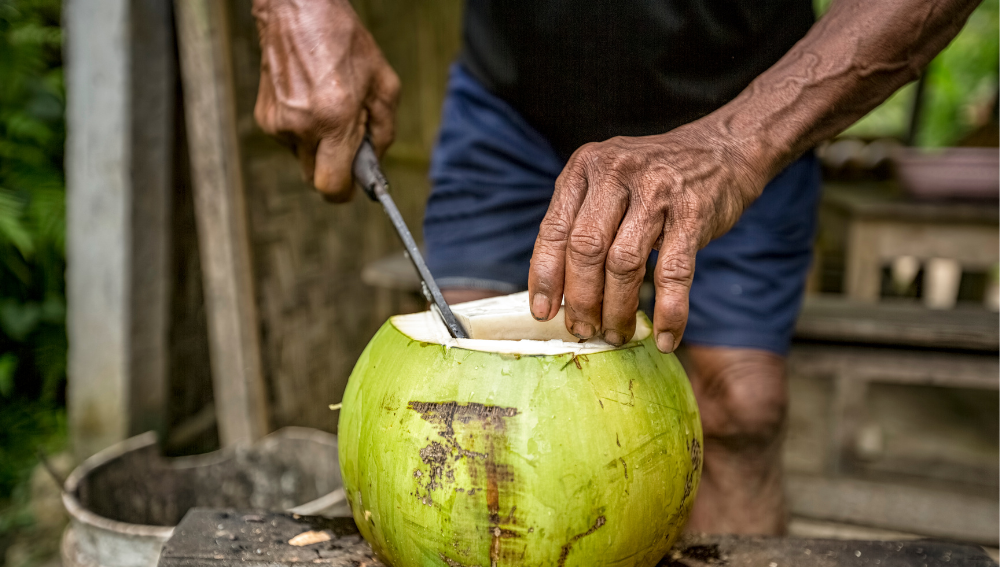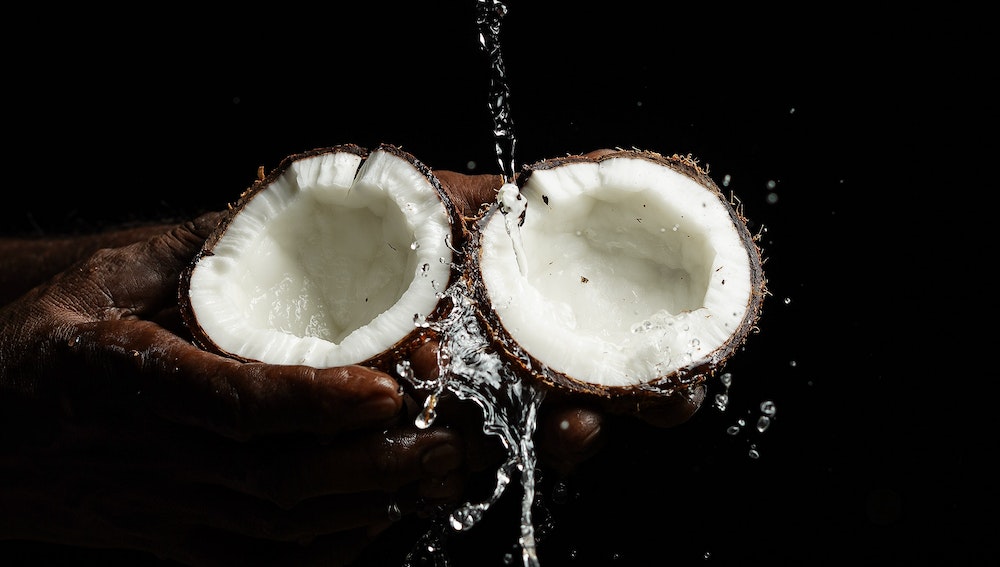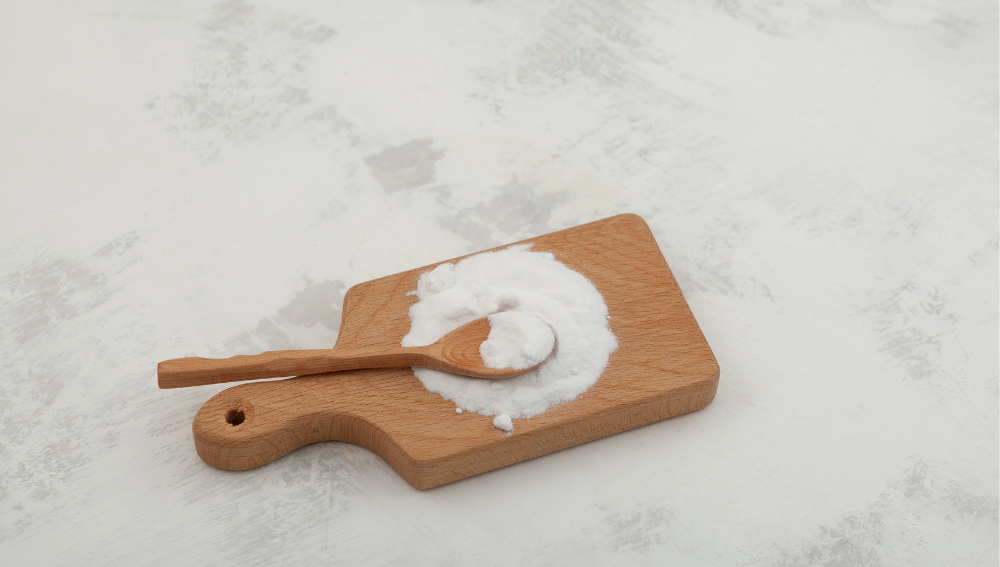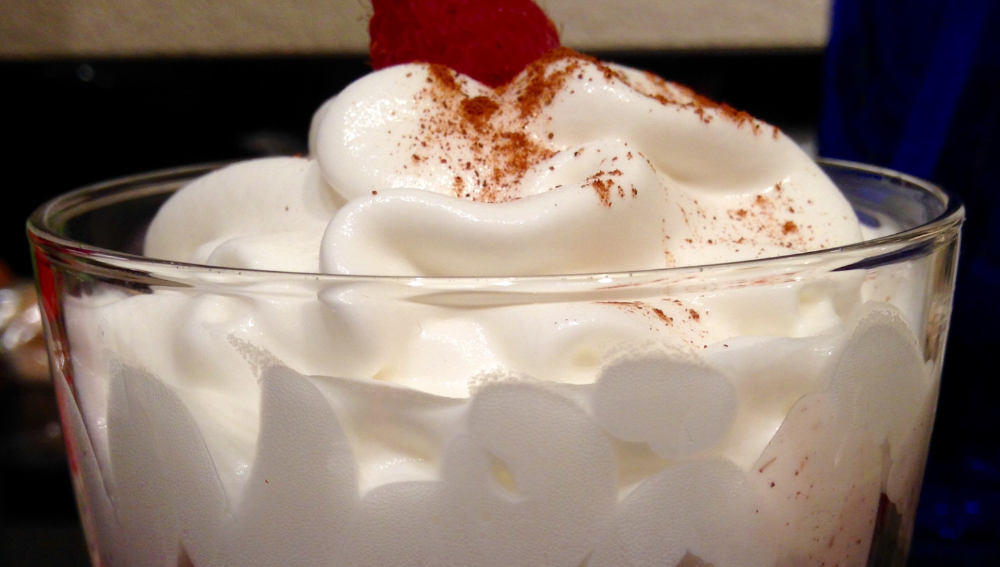As someone who loves to cook and bake, I know how important sugar is in creating delicious desserts and drinks. However, many people are concerned about the health implications of consuming too much cane sugar.
Fortunately, there are many cane sugar substitutes available that can help you reduce your sugar intake without sacrificing taste.

Understanding cane sugar is key to finding the right substitute. Cane sugar is a type of sweetener that is derived from sugar cane. It is often used in baking and cooking because it is easy to work with and has a mild, sweet flavor.
However, cane sugar is also high in calories and can contribute to weight gain and other health problems if consumed in excess.
When it comes to finding a cane sugar substitute, there are many options to choose from. Some popular substitutes include honey, maple syrup, and coconut sugar.
Each of these substitutes has its own unique taste and texture, so it’s important to experiment and find the one that works best for your needs. Additionally, many artificial sweeteners are available, but it’s important to be aware of their potential health risks.
Key Takeaways
- Cane sugar substitutes are a great way to reduce your sugar intake without sacrificing taste.
- Understanding cane sugar is important when choosing a substitute.
- Popular substitutes include honey, maple syrup, and coconut sugar, but it’s important to experiment to find the right one for your needs.
Understanding Cane Sugar
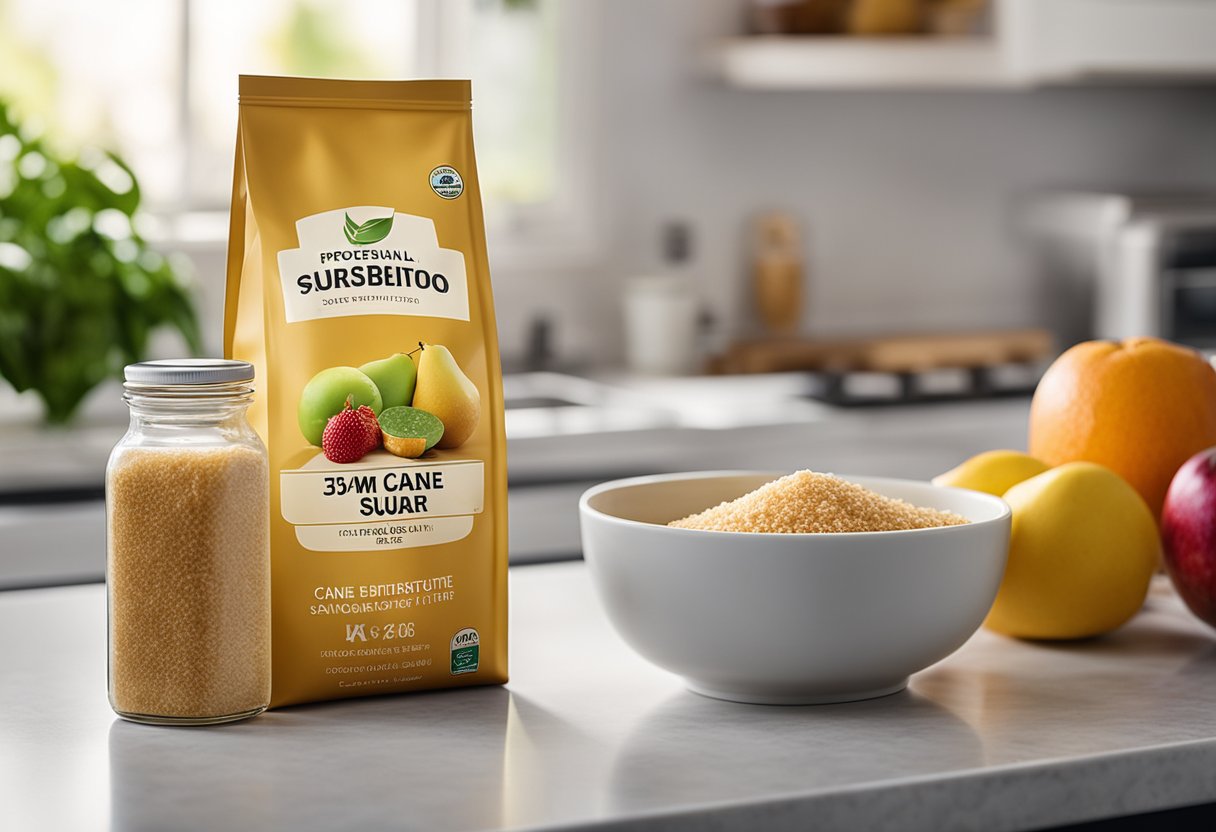
As a type of sugar, cane sugar is derived from sugarcane plants. It is also known as table sugar, granulated sugar, white sugar, refined sugar, and processed sugar.
The sugarcane plant is grown in tropical regions and is harvested for its juice, which is then processed to produce sugar.
Cane sugar is a popular sweetener used in various food and beverage products. It has a sweet taste and a granulated texture. It is commonly used in baking, cooking, and as a sweetener for coffee and tea.
Cane sugar is often compared to beet sugar, which is another type of sugar. However, cane sugar is considered to have a more complex flavor profile and is often preferred by chefs and bakers.
While cane sugar is a natural sweetener, it is still a form of sugar and should be consumed in moderation. Excessive consumption of sugar has been linked to various health issues, such as obesity, diabetes, and heart disease.
In recent years, there has been a growing demand for cane sugar substitutes due to health concerns. Some popular substitutes include beet sugar, honey, maple syrup, agave nectar, and stevia.
These substitutes can be used in baking and cooking, and as sweeteners for beverages.
Overall, cane sugar is a widely used sweetener with a distinct flavor profile. While it should be consumed in moderation, there are various substitutes available for those looking for healthier options.
Health Implications of Cane Sugar
As a cane sugar substitute, it is important to understand the health implications of consuming cane sugar.
Cane sugar is a type of added sugar that is commonly found in processed foods and beverages. It is often used as a sweetener because it is cheap and readily available. However, consuming too much cane sugar can have negative health effects.
One of the main concerns with consuming cane sugar is its high calorie content. Cane sugar is a concentrated source of calories, which can contribute to weight gain and obesity if consumed in excess.
In fact, studies have shown that a high intake of added sugars, including cane sugar, is associated with an increased risk of obesity.
Another concern with consuming cane sugar is its effect on blood sugar levels. When we consume cane sugar, it is rapidly absorbed into the bloodstream, causing a spike in blood sugar levels.
This spike can lead to a crash in blood sugar levels shortly after, which can leave us feeling tired and sluggish.
Furthermore, consuming too much cane sugar has been linked to an increased risk of developing type 2 diabetes. This is because a high intake of added sugars can lead to insulin resistance, which is a key factor in the development of type 2 diabetes.
Finally, consuming too much cane sugar has been linked to an increased risk of heart disease. This is because a high intake of added sugars, including cane sugar, can lead to an increase in blood triglyceride levels, which is a risk factor for heart disease.
Overall, while cane sugar can be a tasty addition to foods and beverages, it is important to consume it in moderation.
By limiting our intake of cane sugar, we can reduce our risk of developing negative health outcomes such as obesity, type 2 diabetes, and heart disease.
Cane Sugar in Cooking and Baking
As a baker, I know that cane sugar is a staple ingredient in many recipes. However, for those who are looking for a healthier alternative or have dietary restrictions, there are many substitutes available that can be used in place of cane sugar.
One of the most popular substitutes for cane sugar is honey. Honey is a natural sweetener that can be used in a variety of recipes, including cookies, desserts, cakes, and more.
When using honey as a substitute, it is important to reduce the amount of liquid in the recipe and lower the oven temperature by 25 degrees Fahrenheit to prevent browning.
Another great substitute for cane sugar is maple syrup. Maple syrup has a unique flavor that can add depth to baked goods, such as muffins and cakes.
When using maple syrup as a substitute, it is important to reduce the amount of liquid in the recipe and adjust the baking time since maple syrup can cause baked goods to brown more quickly.
Coconut sugar is another popular substitute for cane sugar. It is made from the sap of coconut palm trees and has a similar taste to brown sugar. Coconut sugar can be used in a variety of recipes, including glazes and buttercream.
When using coconut sugar as a substitute, it is important to note that it is less sweet than cane sugar, so you may need to use more of it in your recipe.
Other substitutes for cane sugar include beet sugar, date sugar, and agave nectar. Each of these substitutes has its own unique flavor and properties that can be used in different recipes.
When experimenting with substitutes, it is important to keep in mind that the texture and taste of your baked goods may be slightly different than when using cane sugar.
Overall, there are many substitutes available for cane sugar that can be used in cooking and baking.
By experimenting with different substitutes and adjusting recipes as needed, you can create delicious and healthy baked goods that meet your dietary needs and preferences.
Common Cane Sugar Substitutes
https://www.youtube.com/watch?v=kcnGmKi3xms
As a chef, I have experimented with many different types of sweeteners to replace cane sugar in my recipes. Here are some of the most common cane sugar substitutes that I have found to work well in baking and cooking:
1. Honey
Honey is a natural sweetener that is sweeter than cane sugar, so you will need to use less of it. It is best to use light-colored honey to keep the sweetness as neutral as possible.
Most people use ¾ of honey when a cup of sugar is called for. Honey is also a great source of antioxidants and has antibacterial properties.
2. Maple Syrup
Maple syrup is another natural sweetener that is a great substitute for cane sugar. It is a good source of antioxidants, vitamins, and minerals. Use ¾ of a cup of maple syrup when a cup of sugar is called for in a recipe.
3. Brown Sugar
Brown sugar is a great substitute for cane sugar in recipes that require a caramel flavor. It is made by adding molasses to white sugar. Use 1 cup of brown sugar when a cup of sugar is called for in a recipe.
4. Beet Sugar
Beet sugar, whether it is white or brown, is a great alternative to cane sugar. It has a similar taste and texture as cane sugar. Use it in the same quantity you would normally use cane sugar.
5. Coconut Sugar
Coconut sugar is a natural sweetener that is made from the sap of coconut palms. It has a lower glycemic index than cane sugar and is a good source of vitamins and minerals. Use 1 cup of coconut sugar when a cup of sugar is called for in a recipe.
6. Stevia
Stevia is a natural sweetener that comes from the Stevia rebaudiana plant. It is calorie-free, 200 times sweeter than cane sugar, and does not affect blood glucose levels. You can purchase stevia in powder or liquid form at your local grocery store or health food store.
7. Fruit
Fruit, such as mashed bananas, applesauce, or pureed dates, can be used as a natural sweetener in recipes. They add flavor and moisture to baked goods and are a good source of vitamins and fiber.
8. Agave Syrup
Agave syrup is a natural sweetener that is made from the sap of the agave plant. It has a lower glycemic index than cane sugar and is a good source of vitamins and minerals. Use ¾ of a cup of agave syrup when a cup of sugar is called for in a recipe.
9. Turbinado Sugar
Turbinado sugar is a raw sugar that has been partially refined. It has a slightly caramel flavor and is a good substitute for cane sugar in recipes that require a caramel flavor. Use 1 cup of turbinado sugar when a cup of sugar is called for in a recipe.
10. Sucralose
Sucralose is an artificial sweetener that is 600 times sweeter than cane sugar. It is calorie-free and does not affect blood glucose levels. It is often used in recipes that require a low-calorie sweetener.
In conclusion, there are many substitutes for cane sugar that can be used in baking and cooking. Each substitute has its own unique flavor and health benefits.
I recommend experimenting with different substitutes to find the one that works best for your recipe and taste preferences.
Artificial Sweeteners
As a cane sugar substitute, artificial sweeteners are a popular choice for those looking to reduce their sugar intake.
Artificial sweeteners are synthetic sugar substitutes that are often much sweeter than traditional sugar, meaning that less is needed to achieve the same level of sweetness.
One of the most well-known artificial sweeteners is aspartame. Aspartame is often used in diet sodas and other low-calorie products.
While some studies have raised concerns about the safety of aspartame, the FDA has deemed it safe for consumption in limited quantities.
Another popular artificial sweetener is saccharin, which is commonly found in tabletop sweeteners like Sweet’N Low. Saccharin has been used for over a century and is generally considered safe for consumption.
Sucralose is another artificial sweetener that is often used in low-calorie products. It is made from sugar but is modified to eliminate calories. Sucralose is considered safe for consumption by the FDA.
While artificial sweeteners can be a useful tool for those looking to reduce their sugar intake, it is important to remember that they are not a perfect substitute for cane sugar.
Some people may experience adverse reactions to artificial sweeteners, and they may not provide the same flavor profile as traditional sugar. It is important to read labels carefully and use artificial sweeteners in moderation.
Nutritional Comparison of Cane Sugar and Substitutes
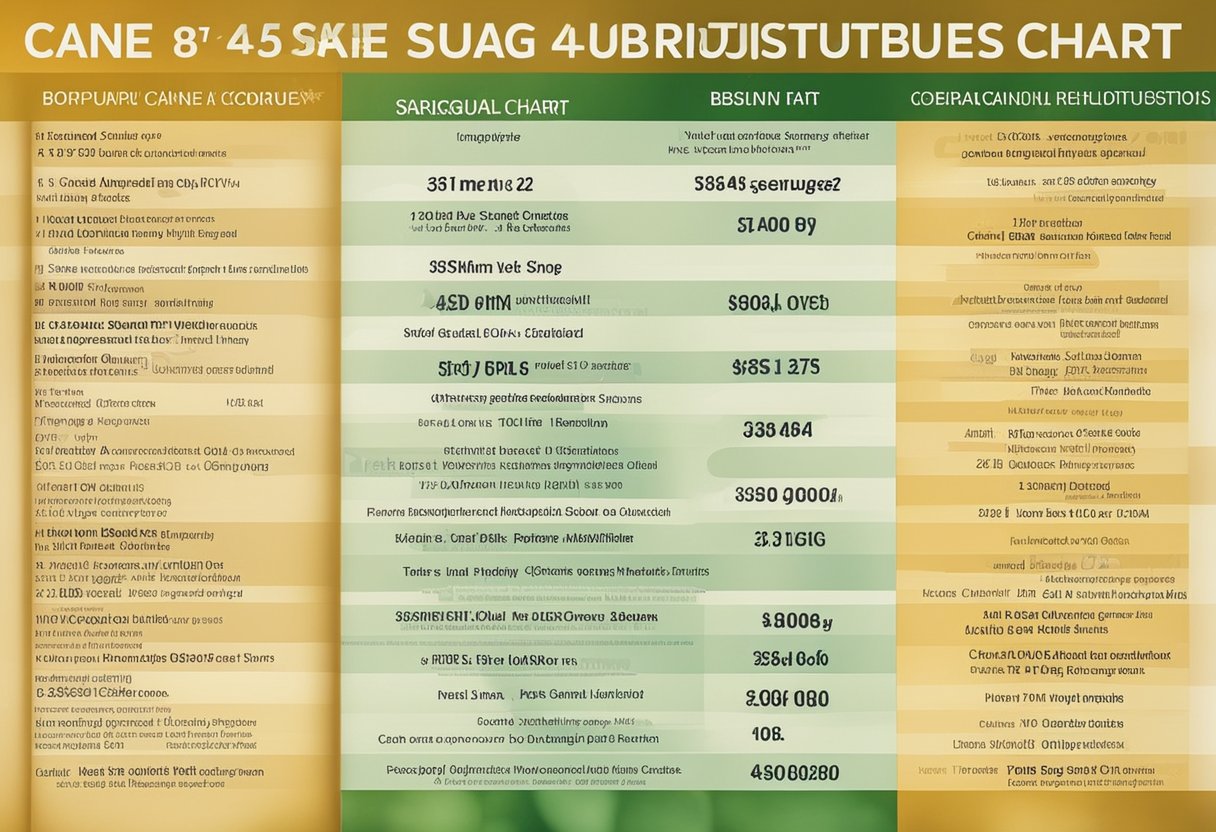
As someone who is looking for a cane sugar substitute, it’s important to understand the nutritional differences between cane sugar and its alternatives.
While cane sugar is a common ingredient in many recipes, it is high in calories and low in nutrients. Here’s a comparison of the nutritional values of cane sugar and some popular substitutes:
Beet Sugar
Beet sugar is a natural substitute for cane sugar that is made from sugar beets. It has a similar taste to cane sugar and can be used in the same quantity in recipes.
Beet sugar is a good source of dietary fiber, calcium, iron, and potassium, making it a healthier option than cane sugar. It is also lower in calories compared to cane sugar.
Honey
Honey is a natural sweetener that is often used as a substitute for cane sugar. It is high in calories but has some nutritional benefits. Honey contains antioxidants and small amounts of vitamins and minerals such as calcium, iron, and magnesium.
However, it is important to note that honey should not be given to infants under one year of age due to the risk of botulism.
Stevia
Stevia is a zero-calorie sweetener that is derived from the leaves of the Stevia rebaudiana plant. It is a popular alternative to cane sugar for people who are looking to reduce their calorie intake.
Stevia is also a good source of potassium and magnesium. However, it is important to note that some people may experience a bitter aftertaste when using stevia.
Erythritol
Erythritol is a sugar alcohol that is commonly used as a sugar substitute. It has a similar taste and texture to cane sugar but is lower in calories.
Erythritol is also a good source of magnesium and calcium. However, it is important to note that consuming large amounts of erythritol can cause digestive issues such as bloating and diarrhea.
Conclusion
In conclusion, there are many cane sugar substitutes available that are healthier and lower in calories than cane sugar.
Beet sugar, honey, stevia, and erythritol are all good options for people who are looking to reduce their sugar intake. It is important to choose a substitute that fits your dietary needs and preferences.
Taste and Texture Differences
When it comes to substituting cane sugar, there are a few things to keep in mind. One of the most significant differences is the taste.
Cane sugar has a unique flavor that is difficult to replicate with other sweeteners. However, there are several alternatives that can come close to mimicking the taste of cane sugar.
Some of the most popular cane sugar substitutes include beet sugar, coconut sugar, honey, maple syrup, and agave nectar. Each of these options has its own distinct flavor profile.
Beet sugar, for example, has a similar taste and texture to cane sugar, while coconut sugar has a caramel-like flavor that can add richness to baked goods.
Another factor to consider when substituting cane sugar is the color. Cane sugar has a natural golden hue that can affect the appearance of your finished product. Some substitutes, like coconut sugar and maple syrup, can also add color to your baked goods.
In terms of sweetness, most cane sugar substitutes are just as sweet as cane sugar. However, some sweeteners, like honey and agave nectar, are sweeter than cane sugar and may require adjustments to the amount used in a recipe.
When it comes to liquids, some cane sugar substitutes may be more or less viscous than cane sugar.
Maple syrup, for example, is thinner than cane sugar and can affect the texture of your baked goods. Agave nectar, on the other hand, is thicker and can add moisture to your finished product.
Overall, the taste and texture differences between cane sugar and its substitutes can vary depending on the specific sweetener you choose.
However, with a little experimentation, it is possible to find a substitute that works well in your favorite recipes without sacrificing quality or taste.
Storage and Shelf Life
As someone who frequently uses cane sugar substitutes, I have learned that proper storage is crucial for maintaining its quality and shelf life.
Here are some tips on how to store cane sugar substitutes:
- Temperature: Raw cane sugar should be stored at room temperature, between 60°F and 80°F. Exposure to high temperatures can cause the sugar to clump or harden, making it difficult to use.
- Handling: Raw cane sugar should be handled with clean, dry hands or utensils to prevent contamination. Moisture can cause the sugar to spoil or develop mold.
- Airflow: It is important to store cane sugar substitutes in an airtight container to prevent exposure to air. Air can cause the sugar to dry out or absorb moisture, affecting its texture and flavor.
When stored properly, raw cane sugar has an indefinite shelf life. However, other cane sugar substitutes may have different shelf lives depending on their composition and processing.
For example, honey and maple syrup can last for several years if stored properly, while other substitutes may have a shorter shelf life.
It is important to check the label or manufacturer’s instructions for specific storage recommendations.
Additionally, it is recommended to purchase top quality refined sugar from trusted commercial sources to ensure the best quality and shelf life.
Overall, proper storage and handling of cane sugar substitutes is essential for maintaining their quality and shelf life.
By following these tips, you can ensure that your cane sugar substitutes are always fresh and ready to use.
Unique Uses of Cane Sugar Substitutes
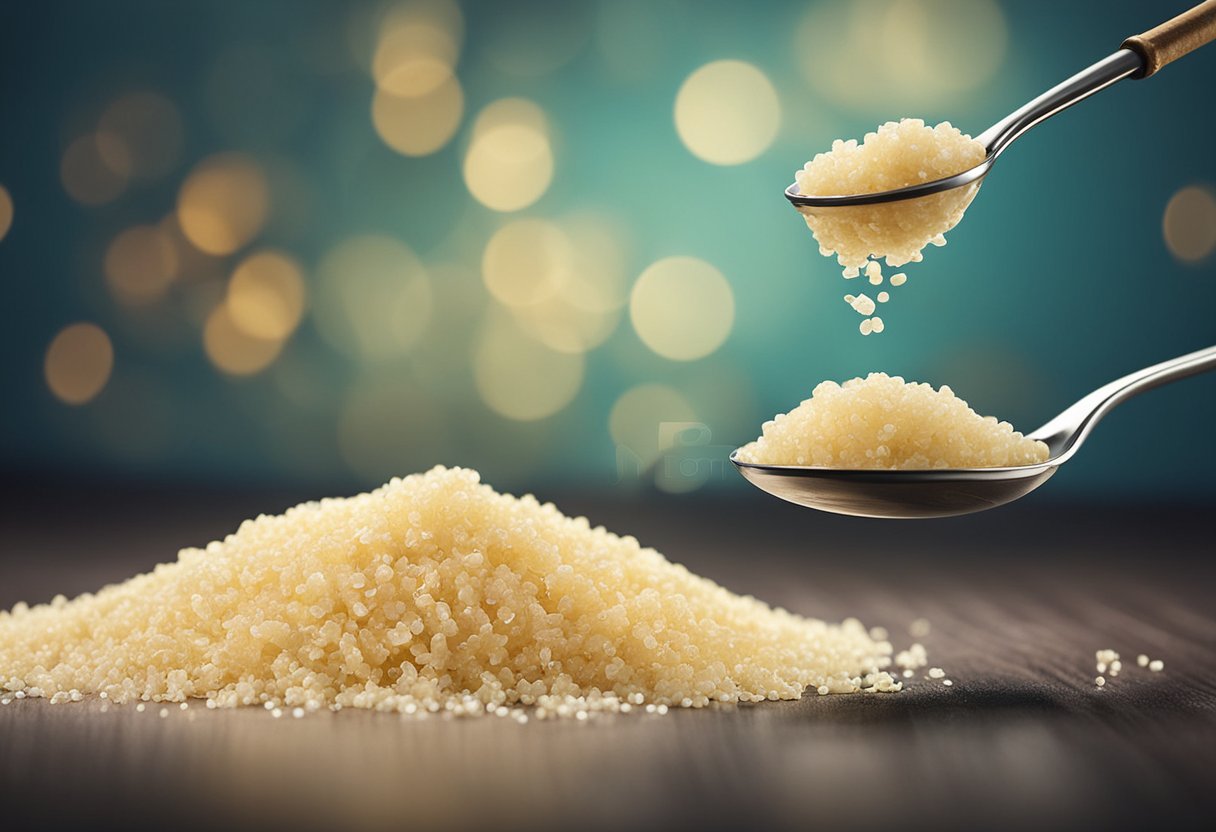
As a baking enthusiast, I have experimented with various cane sugar substitutes. However, I have also discovered some unique uses for these substitutes beyond just baking.
Here are some of my favorite ways to use cane sugar substitutes:
Simple Syrup
Simple syrup is a staple in any bartender’s arsenal. It’s used to sweeten cocktails and drinks without leaving a grainy texture. While cane sugar is the traditional ingredient for simple syrup, you can easily substitute it with other sweeteners.
For example, I like to use xylitol or jaggery to sweeten my simple syrup. Both sweeteners dissolve easily in water and impart a unique flavor to the syrup.
Coffee
If you’re a coffee lover, you know that adding sugar to your coffee is a quick way to sweeten it up. However, if you’re looking for a healthier alternative to cane sugar, try using blackstrap molasses.
Not only is it a good source of iron and calcium, but it also adds a rich, caramel-like flavor to your coffee.
Powdered Sugar
Powdered sugar is a must-have ingredient for any baker. It’s used to make frosting, glazes, and other sweet treats.
However, if you’re out of powdered sugar and need a quick substitute, try using caster sugar. Just blend it in a blender until it becomes a fine powder, and voila! You have homemade powdered sugar.
Ice Cream
Homemade ice cream is a delicious treat, but it can be tricky to sweeten without using cane sugar. One alternative is to use jaggery. It imparts a deep, complex flavor to the ice cream and helps to keep it soft and scoopable.
Jaggery
Jaggery is a traditional sweetener used in Indian cuisine. It’s made from sugarcane juice and has a rich, caramel-like flavor. It’s a great substitute for cane sugar in desserts like rice pudding, carrot halwa, and gulab jamun.
Xylitol
Xylitol is a popular sugar substitute that’s commonly used in sugar-free gum and candy. However, it’s also a great substitute for cane sugar in baking. It has a similar sweetness level and can be used in a 1:1 ratio.
Overall, there are many unique uses for cane sugar substitutes beyond just baking. Whether you’re sweetening your coffee or making homemade ice cream, these substitutes can add a new dimension of flavor to your favorite recipes.
Frequently Asked Questions

What is the difference between cane sugar and coconut sugar?
Cane sugar comes from sugarcane while coconut sugar comes from the sap of coconut palm trees.
Coconut sugar has a lower glycemic index than cane sugar, which means it causes a slower rise in blood sugar levels. Additionally, coconut sugar has more minerals and vitamins than cane sugar.
What is the difference between cane sugar and brown sugar?
Brown sugar is just cane sugar with molasses added to it. It has a slightly different flavor and color than regular cane sugar.
What is the scientific name for cane sugar?
The scientific name for cane sugar is sucrose.
Is cane sugar considered healthy?
Cane sugar is high in calories and has been linked to health concerns such as weight gain and type II diabetes. However, it can be enjoyed in moderation as part of a balanced diet.
What are some substitutes for cane sugar?
There are many substitutes for cane sugar including beet sugar, honey, maple syrup, agave nectar, molasses, stevia, brown rice syrup, date sugar, barley malt syrup, and corn syrup.
Can brown sugar be used as a substitute for cane sugar?
Yes, brown sugar can be used as a substitute for cane sugar in most recipes. Keep in mind that brown sugar has a slightly different flavor and moisture content than regular cane sugar, so it may affect the texture and taste of the final product.



